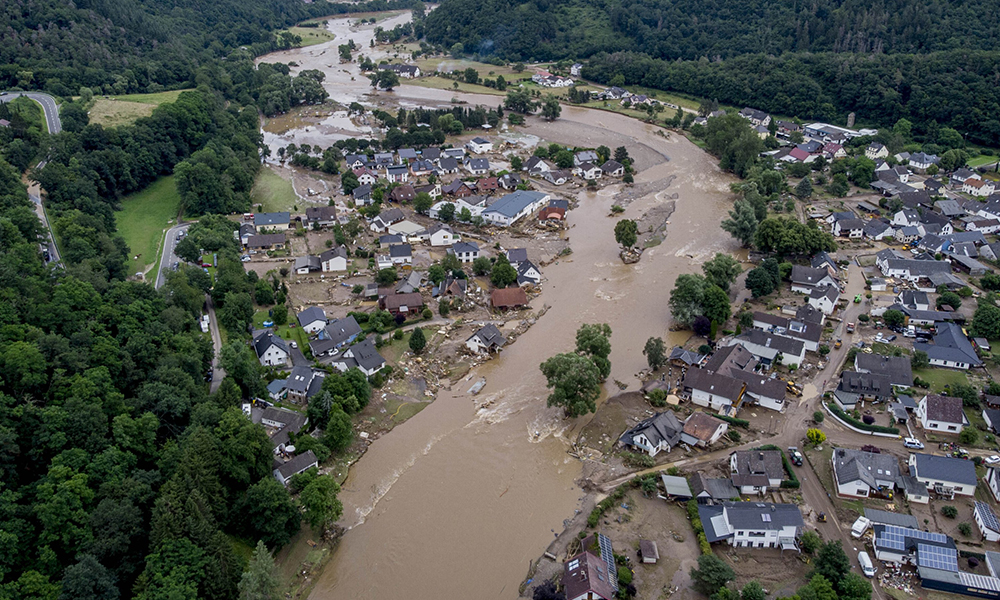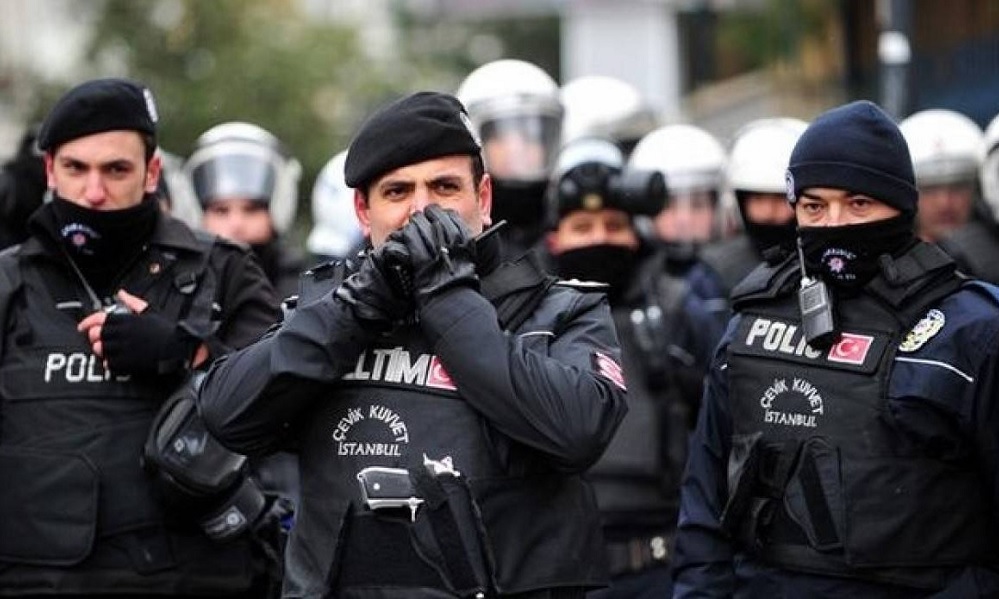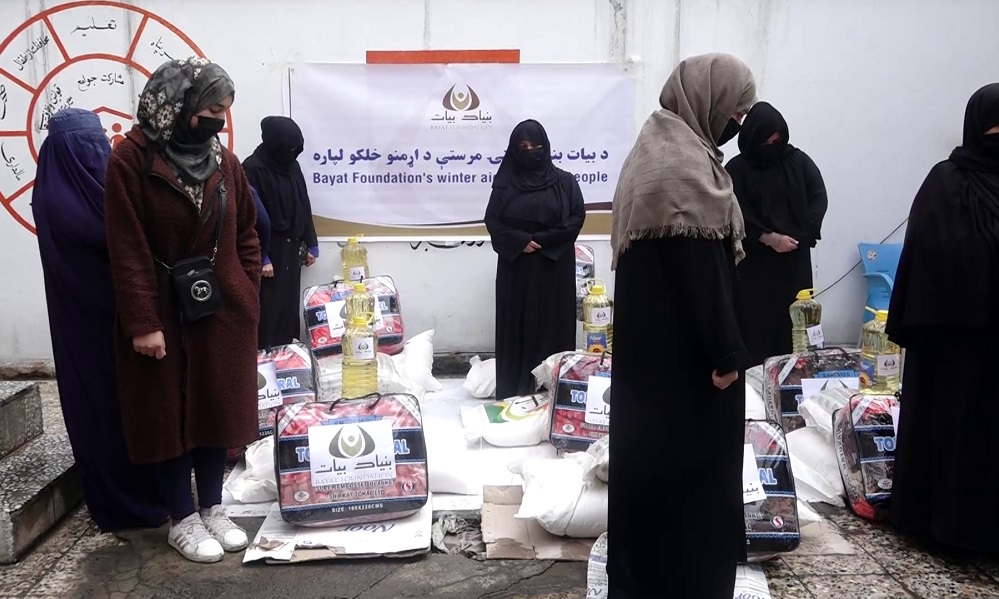Latest News
Germany, Belgium floods: at least 100 dead, more than 1,000 missing

More than 1,000 people were missing and more houses were destroyed in flood-stricken regions in western Germany and Belgium on Friday where further flooding was feared with the death toll already over 100.
Entire communities lay in ruins after swollen rivers swept through towns and villages in the German states of North Rhine-Westphalia and Rhineland-Palatinate, Belgium and the Netherlands.
“It was terrible not to able to help the people. They were waving at us out of the windows. Houses were collapsing to the left and right of them and in the house between they were waving,” Frank Thel, a resident of Schuld, told Reuters in front of a pile of rubble in the town, where several buildings had collapsed. “We were lucky, we survived,” he said.
In Germany alone, more than 90 people have died in what is the country’s worst mass loss of life in years. That number was feared to rise further as more houses collapsed, while in Belgium media said the death toll was at least 14.
“The water had such enormous power! We were in the house, it blew the door open and I was thrown against the chimney- stove. That’s how much pressure the water had when filling the house,” Thel said of the shock in the night that changed everything for them.
“It just went so fast. We just couldn’t save anything. The water came so fast, I’ve never seen anything like that. We were on the bridge down there and I thought, this might be getting tight, and then it was over, the water rose and rose continually, and I realized, it’s useless now to try save anything. Car, gone, all gone, digger, gone, it was all gone.”
The Infrastructure has been destroyed completely, roads washed away, the sanitation system submerged and phone and internet networks are either completely down or instable, meaning lots of people cant be traced or accounted for.
“Here in Schuld the question today is: What can be cleared here now? Can we restore roads? Bridges have collapsed, making areas difficult to access. The infrastructure with water, electricity and the sanitation supply etc is difficult. We have to rebuild them. This has already happened here in Schuld. Downstream in Insul, people had to be evacuated yesterday and we still have to rebuild the infrastructure there,” firefighter Andreas Solheid, of the fire-fighter association of Adenau municipalities said.
In the neighbouring Ahrweiler district in North Rhine-Westphalia, around 1,300 people were missing the district government said on Facebook.
Mobile phone networks have collapsed in some of the flood-stricken regions, which means that family and friends are unable to track down their loved ones.
Further north, in Erftstadt near Cologne, several houses collapsed on Friday morning, and rescue crews were struggling to reach residents by boat. Roads around the town Erftstadt were impassable as they were washed out in the floods.
It was not clear whether there were any casualties as rescuers had to rely on walkie-talkies to relay information.
One dam close to the Belgian border, the Rurtalsperre, flooded, while another, the Steinbachtalsperre, was stabilised early on Friday. Some 4,500 people have been evacuated from communities downstream, and a stretch of the A61 motorway has been closed amid fears of a breach.
Latest News
Turkish intelligence captures a Daesh member near the Durand Line

Turkish intelligence agents have captured a senior member of Daesh near the Durand Line, reportedly preventing planned suicide attacks in Turkey and other countries, according to Turkey’s state-run Anadolu Agency on Monday.
The suspect, identified as Mehmet Goren, is a Turkish citizen. He was apprehended during a covert operation and transferred to Turkey. Details on the timing of the operation or the involvement of Afghan and Pakistani authorities were not disclosed.
According to the report, Goren had risen through the ranks of Daesh and was allegedly tasked with carrying out suicide bombings in Turkey, Pakistan, Afghanistan, and Europe.
Daesh has a history of deadly attacks in Turkey, including the January 1, 2017 shooting at an Istanbul nightclub that killed 39 people.
Anadolu Agency reported that Goren’s arrest also provided intelligence on the group’s recruitment strategies and planned activities.
Latest News
Dozens of needy families in Kabul receive winter aid from Bayat Foundation

Dozens of needy families in Kabul’s fifth district have received essential winter assistance from the Bayat Foundation, as part of ongoing efforts to ease hardship during the cold season and worsening economic conditions.
According to foundation officials, the aid package includes staple food items such as flour, rice, and cooking oil, along with warm blankets to help families cope with freezing temperatures. Haji Mohammad Ismail, Deputy Head of Bayat Foundation, said the distribution began in Kabul and will soon be expanded to other provinces.
“Our assistance includes flour, rice, cooking oil, and blankets,” Ismail said. “Today, we started distributing these items in Kabul’s fifth district, and God willing, the aid will reach other provinces in the near future.”
Afghanistan continues to face widespread poverty, unemployment, and food insecurity, with many families struggling to meet basic needs, particularly during winter when access to work and heating becomes more difficult.Humanitarian organizations and charitable foundations have stepped up relief efforts to support those most affected.
Beneficiaries welcomed the assistance, describing it as a lifeline. “May God bless you for helping the poor. We had nothing and no work,” said one recipient. Another added, “Thank you for your help. Our flour was almost finished.”
Bayat Foundation officials stressed that winter aid distributions will continue in Kabul and other provinces in the coming days, as part of their broader commitment to supporting needy families across the country.
Latest News
Nearly seven million Afghan refugees return home since Islamic Emirate’s takeover

Since the Islamic Emirate came to power, approximately 6.8 million Afghans have returned home, either voluntarily or forcibly, from neighboring countries and other nations, according to the Minister of Refugees and Repatriation.
Mawlawi Abdul Kabir, speaking at a meeting on finalizing a draft plan for a permanent migration solution in Afghanistan, added that 1.3 million Afghans have been internally displaced due to natural disasters during the same period.
With winter approaching, widespread poverty and severe cold are threatening thousands of lives. Meanwhile, the forced expulsion of Afghan migrants from neighboring countries, particularly Iran and Pakistan, continues.
The Islamic Emirate has repeatedly urged neighboring states to allow migrants to return voluntarily. According to UNHCR, over two million Afghans have returned from Iran and Pakistan since the start of 2025.
-

 Latest News3 days ago
Latest News3 days agoAfghan border forces prevent illegal entry of hundreds into Iran
-

 Latest News3 days ago
Latest News3 days agoPakistan summons Afghan diplomat over deadly attack in North Waziristan
-

 Latest News1 day ago
Latest News1 day agoAfghanistan signs 30-year deal for marble mining in Daikundi
-

 Latest News2 days ago
Latest News2 days agoAfghan health minister calls for medical cooperation between Kabul and New Delhi
-

 Latest News3 days ago
Latest News3 days agoJapan allocates nearly $20 million in humanitarian aid for Afghanistan
-

 Latest News3 days ago
Latest News3 days agoKarzai urges reopening of girls’ schools and universities for Afghanistan’s bright future
-

 Health5 days ago
Health5 days agoAfghanistan seeks India’s support in standardizing traditional medicine
-

 World5 days ago
World5 days agoUS readies new Russia sanctions if Putin rejects peace deal, Bloomberg News reports
























